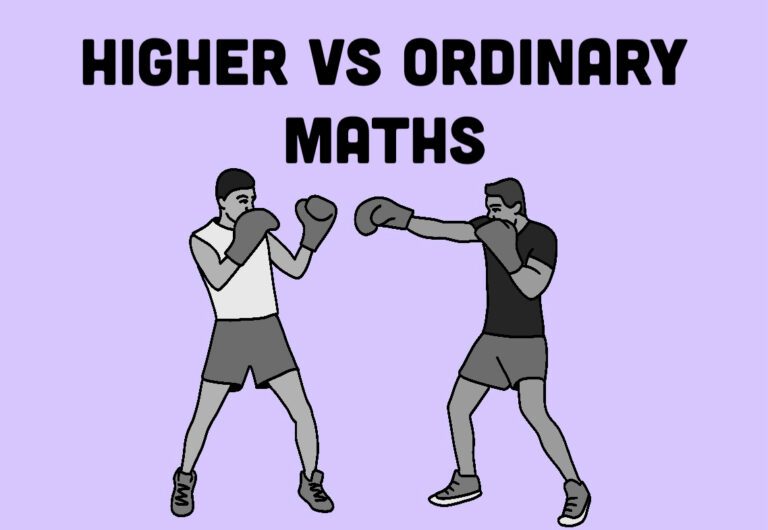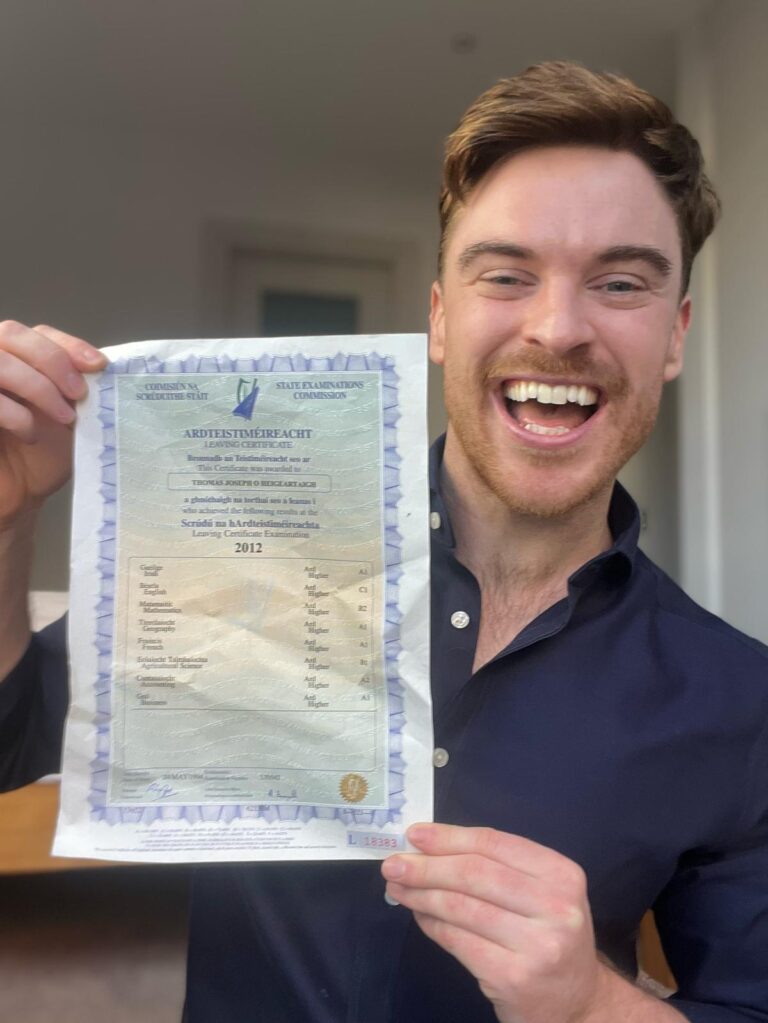WhatsApp:
+353 87 202 0389
State Exam Myths
The Leaving Cert (and Junior Cycle) are shrouded in mystery. There are a number of potential reasons for this, including the fact that most people only sit each of these sets of exams once in their life and then rid the experience from their memory forever.
Fortunately for you (and perhaps somewhat unfortunately for us), working with Breakthrough Maths means that we have not quite forgotten the horrors of the State Exams. In this article, we’re myth-busting the top 10 most common misconceptions about the Leaving Cert (& Junior Cycle!)
1. What counts as a fail in the Leaving Cert/Junior Cycle?
Misconception: I got 39% in my mock so that wouldn’t even give me any points!
The misconception that anything under 40% is a fail is rooted in the old grading system (pre-2017).
Today, whether or not it is possible to fail the Junior Cycle or Leaving Cert is up for debate, purely based on how it’s worded.
According to the new Junior Cycle Grading system, anything above 20% is considered a pass. Below 20% falls under the category of ‘Not Graded.’
At Leaving Cert Level, you will not be awarded any CAO points if you do not achieve a certain percentage, but this varies depending on subject level:
For Higher Level, scoring below 30% will not earn you any CAO points. At Ordinary Level, you need to get 40% to receive the minimum points, and for Foundation Level students, you must achieve above 80% to receive any points.
Whether or not you can fail a State Exam comes down to a linguistic technicality, but the good news is that the percentage of candidates achieving less than 30% at Higher Level and 40% at Ordinary Level is REALLY low (like, less than 1% most of the time), so you don’t need to worry too much about this!
2. If you ‘fail’ maths, do you fail the whole Leaving Cert/Junior Cert?
Misconception: Dya know if you fail maths in the Leaving, you fail the whole thing?
The answer to this is NO – ‘failing’ maths is no different to failing any other subject in your State Exams. Your Leaving Cert/JCPA is still completely valid!
If you get a ‘Not Achieved’ in maths at Junior Cycle level may mean your school won’t allow you to sit Higher Level Maths for the Leaving, but if it’s a case that you think you just didn’t work as hard as you could have, it is just a matter of making your case to the school that you’re willing to put in the effort this time around.
Failing maths at Leaving Cert level may mean you will miss out on a place on a particular course in a particular university (because you failed to achieve the minimum matriculation requirements) but there are often options to sit an additional exam in maths to prove you can handle the coursework.
This common misconception deters a lot of students from sitting Higher Level Maths every year, but the truth is, failing Higher Level Maths is a lot less common than you would think! Check out our blog where we Demystify the Grading curve!
3. What percentage do you need to get in Higher Level Maths to get the extra 25 points?
Misconception: I’m doing Higher Level Maths because you just need to pass the exam and you get an extra 25 points!
People often assume that you just need a pass (or above 30%) in Higher Level Maths to get those delicious bonus points, but the truth is, you need to get at least a H6 or 40% to qualify for the extra 25 CAO points.
Psst! If you’re struggling with Maths, check out our maths grinds! We see an average grade increase of 16% among our students, and we’ll give you a FREE trial!
Check out this table to calculate how many points Higher Level Maths carries based on your grade:
| Percentage | Grade | Points for Maths |
| 90-100% | H1 | 125 |
| 80-89% | H2 | 113 |
| 70-79% | H3 | 102 |
| 60-69% | H4 | 91 |
| 50-59% | H5 | 81 |
| 40-49% | H6 | 71 |
| 30-39% | H7 | 37 |
| 0-29% | H8 | 0 |
That extra 25 makes a huge difference, right? Look at the jump from a H7 to a H6! A H6 suddenly becomes almost as valuable as a H3!
More interesting still, if you get a H3 in Maths, it’s worth more than a H1 in any other subject.
The bonus points should incentivise you to do Higher Level Maths, especially since more than 90% of candidates achieve a H6 or higher in Maths each year, and therefore qualify for the extra 25 points.
But remember, if you aren’t confident that you could achieve the H6 on the day, then it may be worth considering Ordinary Level (but if you really want those points, give our grinds a go!_
4. Do I have to include Maths or other mandatory subjects in my six best subjects?
Misconception: You have to include English, Irish, and Maths in your top six!
Your six best subjects are just that – your six best. They don’t have to include any particular subjects. Check out the example below:
Dawid moved to Ireland from Poland when he was 14 and so was exempt from studying Irish. He is a gifted languages student and achieved 542 points based on the following Leaving Cert results:
English – H4 = 66 points
Maths – H6 = 71 points
French – H1 = 100 points
History – H3 = 77 points
Geography – H3 = 77 points
Music – H2 = 88 points
Polish – H1 – 100 points
Japanese – H1 = 100 points
See? Dawid’s CAO points don’t include any of the mandatory subjects, because they were not among his six highest results, even with the 25 extra points.
5. Do you have to pass a language or science for the Leaving Cert/Junior Cycle?
Misconception: You have to do TWO languages AND a science for the Leaving Cert!
Short answer: No, the only universally compulsory subjects are English and Maths. You are also required to sit Irish unless you have an exemption, and at Junior Cycle, you must also sit History.
After that, subject choice depends entirely on
- what your SCHOOL decides is mandatory, and
- what subjects you need in order to matriculate to the course or university of your choice
In many schools, Modern European Languages and Science are mandatory in Junior Cycle, and sometimes even Leaving Cert. This is usually due to the fact that most of the Universities of Ireland require you to have passed a language, and many STEM courses require you to have studied at least one lab science.
Check out UCD’s Undergraduate Veterinary Medicine Course below as an example: https://www.myucd.ie/courses/veterinary-medicine/veterinary-medicine/
Not only do you need to sit English, Irish, and Maths, but also Chemistry and a foreign language!
But it goes without saying that not everyone sitting the Leaving Cert is aiming for Veterinary, or even to go to a University.
Indeed, most of the students who go onto Third Level after secondary school attend Technical Universities or Institutes of Technology, where the matriculation requirements aren’t as demanding. Often, you can get away without studying a language or science subject if you don’t want to.
Whether or not you study a language or science in school is a CHOICE up to you and your parents. Our advice is to chat with your careers teacher and do your research before making any big decisions.
6. Is it easier to pass certain subjects?
Misconception: Sure I’ll just do Art and Music, everyone passes those! Can’t be that hard!
Every year, there’s at least one poor soul who picks their subjects purely based on the highest rate of H1s and/or passing grades.
And while that may sound like a foolproof strategy, it’s quite the opposite.
Subjects like Music, Art, and Applied Maths do have slightly lower rates of failure and slightly higher rates of success (i.e. H1s), but only because the students who sit these exams usually have genuine grá for the subject.
Think about it – do you know any Music students who don’t play an instrument outside of school, or sing? Or any Applied Maths students who didn’t correct their teacher in Primary School, Young Sheldon style?
Conversely, we all have to sit English, whether we like it or not, so there’s a broader range of grades with a more even distribution.
Our advice is to pick subjects that you actually enjoy (or at the very least, don’t openly revile) because that is what will give you the best chance at passing!
7. Does failing the aural/oral/practical mean you fail the entire subject?
Misconception: I reckon I bombed that oral, now Spanish won’t even show up on my results!
The misconception that you fail the entire subject if you fail the oral strikes fear in the hearts of Leaving Cert students every February. The good news is, it’s a total myth.
The aural/oral/practical elements of the majority of the subjects available for Leaving Cert is usually worth less than 50% of your final result. So while failing the practical might ruin your chances of getting a H1, you still have the chance to pass.
8. Do your mocks/pre-exams give an accurate prediction of what you’ll get in the Junior Cycle/Leaving Cert?
Misconception: Ah here I got a H3 in Irish, feet up for the rest of the year!
The absolute WORST thing you could do after the mocks is take your foot off the gas. There are a number of reasons for this:
- The mocks are developed by independent examination boards, chiefly the Dublin Examinations Board (DEB) and Examcraft, NOT the State Examinations Commission (SEC). They are not put through the same rigorous regulation process as the actual state exams, nor are their respective marking schemes. They are not completely accurate reflections of Leaving Cert or Junior Cycle papers. They are often slightly easier (but sometimes harder) than the real thing.
- The mocks are not always graded by examiners – often, they are graded by so-called subject experts. Subject experts are only sometimes practicing teachers – a lot of the time, they’re college students or retired teachers. This means they may be out of the loop with syllabus material and developments, but more importantly, unfamiliar with how to apply marking schemes correctly. This may mean you receive scores that are slightly inflated (or deflated).
- The mock results aren’t standardised. In other words, a nicer corrector means higher results and a mean corrector means lower results. Unlike the real thing, there is no bell curve or review of the marking scheme. The mocks are much more rough-and-ready.
- The mocks are usually leaked before they are administered. They are widely available on the web, and it’s even possible to buy past papers if your teacher avoids using this year’s paper. Furthermore, teachers often give students tips or select specific mock papers to test students on what has already been covered in their class, rather than a completely blind test. This means students will receive a grade that is likely much higher than what they would have received in a fair test.
- The mocks are separated from the real state exams by roughly 4 months, meaning there’s likely still a) a lot of material left to be covered and b) a lot of time to forget what you know if you don’t keep on top of your studies. Even if you got a streak of H1s in the mocks, you could end up very disappointed with your actual results unless you keep up the good work.
Long story short, don’t let the mocks get to your head. But neither should you let them get you down! If the mocks go pear-shaped, you just have to dust yourself off and keep trucking along!
9. Does passing the Junior Cycle even matter?
Misconception: Sure, the Junior Cycle doesn’t even matter, not even worth studying for!
The Junior Cycle does matter, perhaps not as much as the Leaving Cert, but it’s a significant milestone and training ground that cannot be ignored for a number of reasons:
- It’s likely the first major exam you will ever take, so it’s worthwhile using it to develop good study habits that you will use for the rest of your life.
- It helps you decide what subjects to take for Leaving Cert, and may even determine whether you can take them in certain schools (more on that later!)
- It provides the foundations for the material covered at Senior Cycle – where it REALLY counts!
While the grades you receive for Junior Cycle aren’t used to determine whether or not you get into a certain course, they aren’t irrelevant to your academic career. It is always worthwhile putting your best foot forward.
10. Does the Leaving Cert affect the rest of your life?
Misconception: A bad Leaving Cert will follow you forever!
The myth that the Leaving Cert is the most important exam in your life is much less prevalent now than in the past.
This is due in no small part to the myriad of back-door routes that exist nowadays – from PLCs to Online Learning Platforms, apprenticeships to EUNICAS, and everything in between, there are so many ways for students to get into their dream course or job.
But even more than that – Leaving Cert results and CAO points are a currency only accepted by undergraduate college courses; beyond that, you’ll need another form of payment.
And we could go on here about kindness and humility and all of that jazz, but the truth is, work ethic is where it’s at.
So work hard for your exams and do your best – that’s the most anyone can ask of you.
And remember, there’s always more than one way to skin a cat 😉
Stay tuned for more information on the Junior Cycle and Leaving Cert throughout the year!
T.J — CEO of Breakthrough Maths.
Need help in Maths? Contact the Breakthrough Maths team here.





